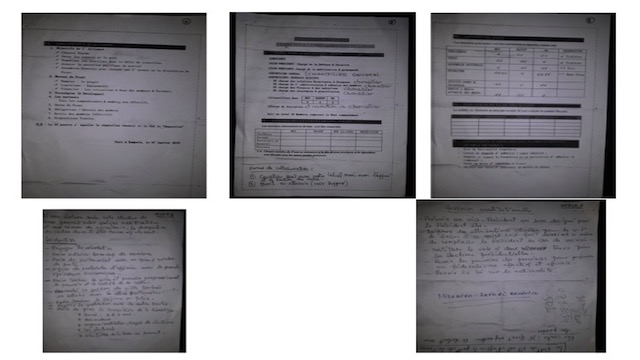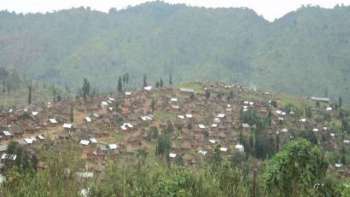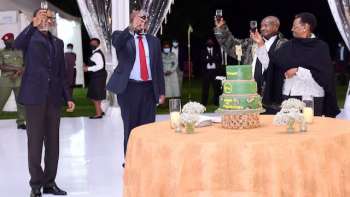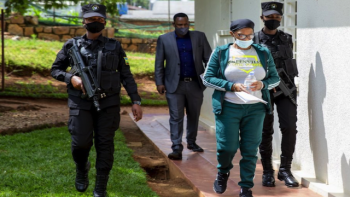Congolese people often joke about the institutions of their country.One of the most ironic jokes is about the Congolese army, known as the Armed Forces of the Democratic Republic of the Congo or FARDC.The joke goes like this: "in our beloved Congo, there is no army. Actually no, there is no professional army. No, that is not true. There are three warlords leading three militias to guide us under the not so benevolent baby dictator".
The truth is that the Democratic Republic of the Congo has one of the largest armies in Africa, with more than 150,000 active soldiers. The problem the joke is pointing to is the fact that this number is more on paper than a reality. In fact, DRC has a rag tag army composed of three main factions with different allegiances, leaders, and types of treatment.
The first faction, which is well equipped, well trained, and well paid, responds to no one other than President Joseph Kabila, referred to in circles, as the "not so benevolent baby dictator." The faction, known as the Republican Guard, only looks after the interests of Joseph Kabila, his family, his relatives and his cronies. In return, the soldiers in the Republican Guard receive the best training inside and outside the country, their salary on time, and generous perks. Most soldiers in the Republican Guard hail from Joseph Kabila's region, Katanga or are special forces sent in by foreign friends of Joseph Kabila, such as Rwandan Defense Minister General James Kabarebe.
Until last year, Angolan forces were also sent in to reinforce the Republican Guard. The active commander of this faction is General Francois Olenga, with the help of General Jean-Claude Yav. Since then, Angola has decided to turn the page on Joseph Kabila (see: DR Congo: Angola withdraws troops as Joseph Kabila brings in Rwandan special forces to Kinshasa).
The second faction is under the powerful Congolese General John Numbi. Accused by several human rights organizations of the assassination of Floribert Chebeya, the former head of the NGO Voice of Voices, and his driver, Fidèle Bazana, in 2010, Gen John Numbi is also under the sanctions by the United States and the European Union, for massacring civilians during 2016 protests asking for Joseph Kabila to step down, at the end of hisconstitutional term.
General Numbi was, subsequently, in Jan 2018, removed from the leadership of the National Police but has recently discreetly returned back to his previous role in the army and regained his influence. Gen John Numbi's troops are mostly from Katanga, where he is as, if not more, popular as Joseph Kabila, and former M23 rebels and soldiers from other friendly or proxy armed groups who have being reintegrated in the army. These troops are relatively regularly paid and better trained, though not at the same level as the Republican Guard.
The third faction is under General Etumba, who officially is the Chief of Staff of the FARDC. He leads a rather fringe, mostly ragtag although numerous faction of the FARDC, not paid, not trained, disorganized, unequipped: the epitome of what is wrong with the FARDC. He is, de facto, irrelevant and is expected to retire soon.
That is why the events about to unfold in the DRC will be very complicated and will, most likely pit Joseph Kabila against Gen John Numbi.
AfroAmerica Network sources have obtained notes and reports from the meeting (see samples) in which the plan of the invasion of DRC was being finalized. According to the notes, John Numbi and Moise Katumbi, who both hail from Katanga and were, in better days, friends, have decided to rekindle their friendship, put their forces toagheter in getting rid of Joseph Kabila.
According to the informations and the meeting notes received by AfroAmerica Network, John Numbi's emissary met Moise Katumbi in Kigali, in April 2018, during the Mo Ibrahim Foundation conference. The plan, already set in motion since January 2018, in Davos, Switzerland and Addis-Abeba, Ethiopia, was refined and finalized (see: Meetings Between Paul Kagame and Moise Katumbi and Mbusa Nyamwisi Delegation in Davos and Addis-Ababa: What Was Said).
The plan of the DRC invasion is as follows:
In July 2018, Gen John Numbi, with the support of ex-M23 rebels already with FARDC, within John Numbi's faction, and some FARDC deserters will stage a coup-d'etat against Joseph Kabila. The pretext of the coup will be the invasion by Rwandan military armed and trained ex-M23 rebels. John Numbi wil justify the coup by accusing Joseph Kabila of being unable to stop ex-M23 rebels and bring peace in the country.
If the coup succeeds, Gen John Numbi will then propose a transitional government of 3 to 5 years. Moise Katumbi will be part of the new government and then will run for President, following the transition.
The planned invasion by ex-M23 rebels in July 2018, will likely see Gen John Numbi's faction pitted against Joseph Kabila's Republican Guard, with General Etumba's ragtag faction ready to join whoever will, finally, be ready to pay their backpay.
















